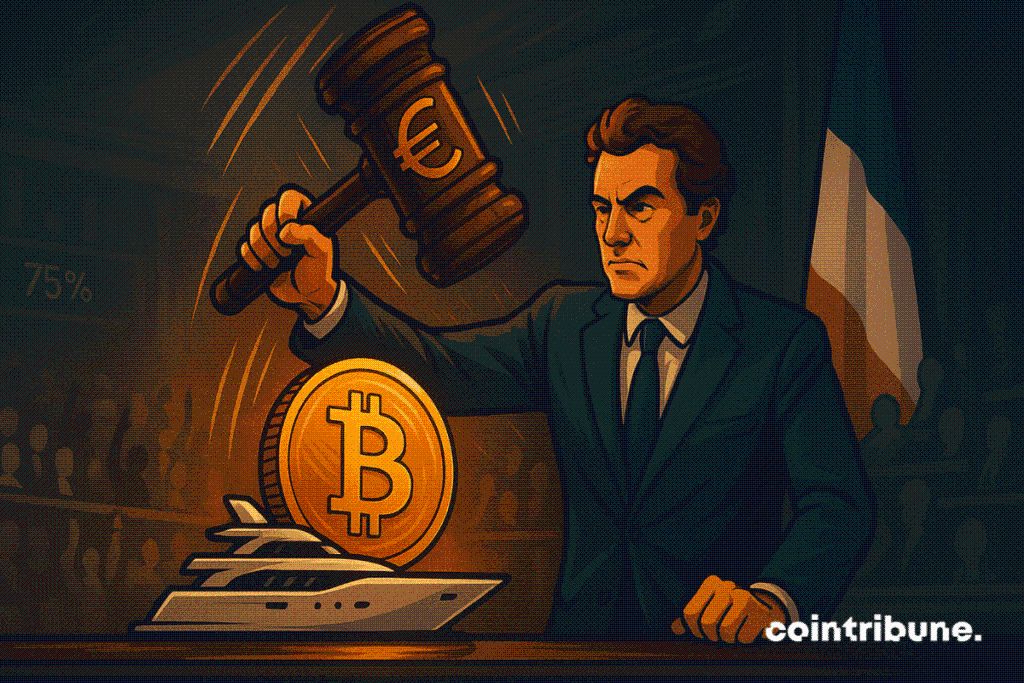France’s National Assembly Passes Controversial Crypto Measure
Are cryptos on their way to becoming a burden for French investors? A recently adopted amendment in the National Assembly could change the game. Bitcoin, Ethereum, and other digital assets would soon be taxed as “unproductive wealth,” on the same level as yachts and hoarded gold.

In brief
- The National Assembly has passed an amendment classifying cryptocurrencies as taxable “unproductive wealth.”
- Only crypto holdings exceeding €2 million would be subject to a flat 1% tax.
- The measure still needs Senate approval before taking effect in early 2026.
- France’s crypto industry warns the move sends a politically hostile signal toward digital innovation.
A fiscal turning point targeting “dormant” wealth
The National Assembly passed a symbolic milestone last Friday. By 163 votes to 150, deputies adopted an amendment that redefines the taxation of wealth in France .
The text, supported by Jean-Paul Matteï, a centrist deputy, aims to address what he considers an “economic inconsistency”: the tax exemption enjoyed by certain assets deemed “unproductive”.
Cryptos now join a list that includes gold, yachts, collector cars, and works of art. The political message is clear. These assets, which do not directly contribute to the “dynamism of the French economy,” should be discouraged by taxation.
The amendment proposes a single rate of 1% on unproductive wealth exceeding 2 million euros, compared to a progressive system currently in place for real estate.
For crypto holders, this measure represents a radical change. Until now, only capital gains realized from the sale of digital assets were taxed.
Now, simply holding a large portfolio could generate an annual tax bill. An investor holding 3 million euros in bitcoin would thus have to pay 10,000 euros each year, without making any gains.
The vote gathered an eclectic coalition. Socialists and far-right deputies allied to pass the text, illustrating cross-party mistrust of digital assets. But the story does not end there. The Senate must still vote before the measure is included in the 2026 budget.
The crypto ecosystem protests against an “ideological error”
Éric Larchevêque does not mince words. The co-founder of Ledger, the French flagship of crypto wallets, denounced on social media a measure that “punishes all savers who want to anchor their financial assets in gold and Bitcoin.”
For him, the political signal is disastrous. He accuses the legislator of wanting to “penalize holding value outside the fiat monetary system.”
The industry’s concerns are multiple. Firstly, the risk of forced liquidations. Many French investors hold the bulk of their wealth in cryptos, without sufficient liquidity to pay an annual tax.
They may have to sell their assets under unfavorable conditions, creating downward pressure on their portfolios. Then, the feared domino effect: a threshold of 2 million euros today, but nothing guarantees that the State won’t lower it tomorrow.
The timing of this initiative is striking. While countries like the United States multiply pro-crypto initiatives and some states consider Bitcoin as a strategic reserve, France seems to be taking the opposite path.
Even more troubling: this vote comes just days after a proposal from the UDR mentioned the creation of a national reserve of 420,000 bitcoins . A French paradox revealing irreconcilable visions within the political class.
The technical challenges are equally worrying. How to accurately assess a crypto wallet held on decentralized platforms or kept offline in a hardware wallet ? How to verify the accuracy of declarations without setting up an oversized administration? These questions remain unanswered and could seriously hinder the practical implementation of this law.
Disclaimer: The content of this article solely reflects the author's opinion and does not represent the platform in any capacity. This article is not intended to serve as a reference for making investment decisions.
You may also like
Bitcoin price below $100,000: Is this the beginning of a deeper crash?
Bitcoin fell to 107K after losing key support. Analysts warn that a drop below 107K could trigger a slide toward 100K or even lower.
Price predictions 11/3: SPX, DXY, BTC, ETH, XRP, BNB, SOL, DOGE, ADA, HYPE

Is the Web3 industry entering a "new era of compliance"? Are we pursuing the wrong kind of "mass adoption"?
As traditional financial institutions are actively promoting the large-scale adoption of blockchain technology, should the Web3 industry also reconsider its own development direction?

